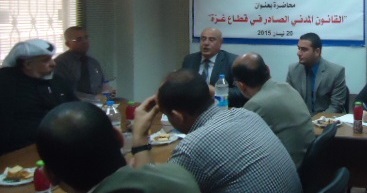The New Civil Law in Gaza
the event brought together a select number of legal experts and academics.
In her opening statement, Ms. Lina at Tounisi, Coordinator of the IoL Gaza Office, welcomed the speaker and audience and made a briefing note about the IoL Legal Encounters programme.
Dr. Mallouh compared provisions of the Ottoman Courts Manual (Mejelle) of 1286 AH [1869 AD] to explanatory notes of the Palestinian Draft Civil Law of 2003. While the Mejelle regulates a limited set of financial transactions, the Draft Civil Law governs all financial enterprises. The Mejelle was enacted more than 100 years ago. Due to cutting edge developments in various aspects of life, financial businesses at the time the Mejelle was passed were radically different from those of today. It was essential, therefore, to promulgate a civil law that meets current community needs and accommodates new developments. The civil law will be open to key civil legislation, including in terms of provisions, classification, and drafting.
Compiled in 2003, the Palestinian Civil Draft Law was then supposed to be approved by the Palestinian Legislative Council (PLC). However, promulgation was obstructed by the internal Palestinian political divide of 2007.
According to Dr. Mallouh, the 2012 Civil Law enacted in Gaza does not take into consideration various perspectives on several issues already regulated by explanatory notes of the 2003 Draft Civil Law.
Dr. Mallouh reviewed some defective provisions of the Gaza-issued Civil Law, including Article 1(2), which identifies sources of the Law. Dr. Mallouh inquired whether provisions on the abuse of rights should be included under general provisions or annexed to omissive responsibility. The Law does not does not sustain relevance of omissive responsibility, nor does it regulate aggravation or mitigation of penal clauses. The Civil Law of Gaza does not adopt civil bankruptcy or the right of jurisdiction. Article 1301 does not repeal previously issued civil regulations. It only provides that the Mejelle will be applicable in matters for which no provision had been made by the Civil Law.
Enforcement of the Civil Law in the Gaza Strip has introduced a substantive change to sources of legal norms, which used to be informed solely by case law. The latter provided an official source of legal norms, which judges had to render court judgements accordingly. Currently, formal sources of legal norms in Gaza include legislation as a general, original and formal source. If a relevant legislative enactment is not in place, judges enter court decisions in accordance with principles of the Islamic Law (Sharia), now a secondary formal source of legal norms. If not, judges adjudicate cases in line with customary practice, natural law, or rules of equity. Judicial practice and jurisprudence are guideline sources, which can inform judges. However, judges are not obliged to put these source to effect.
Elaborating on each, Dr. Mallouh provided an overview of sources of codification under the Civil Law of the Gaza Strip. These include the Mejelle, Islamic jurisprudence, case law, modern civil regulations, and other legislative enactments.
Influenced by the French law, the Gaza-issued Civil Law introduces the theory of nullity to the legal system. In this context, Articles 139-146 of the Law regulate void and voidable contracts.
Participants raised questions and made some informed interventions in the ensuing discussion.











